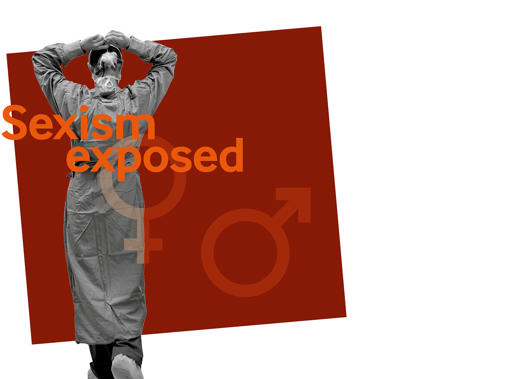As with many forms of discrimination, the existence of sexism is largely undisputed, yet understanding its prevalence, how it manifests and what impact it might be having on the medical profession and health service can be far harder to quantify.
It was partly this fact, as well as her own experiences of sexism in the workplace, that led to one junior doctor, Liverpool-based ST1 emergency medicine Chelcie Jewitt, to speak out on the issue of gender-based discrimination and urge other doctors to come forward.
Dr Jewitt’s efforts to shed light on individual experiences and gain a greater sense of what might be happening on a wider scale, led to the BMA conducting a survey earlier this year.
The study, the results of which have been published this week, canvassed the views of more than 2,500 men and women, working in all parts of UK medicine, from various branches of practice and at different stages of their careers.
Daily offence
While they may only be scratching the surface, the results not only reveal how sexist attitudes and behaviour can be found across all parts of the health service and medical profession, but also the many different forms these can take.
When asked how frequently on average they had personally experienced sexism at work in the past two years, 31 per cent of women doctors said they had experienced it on either a daily or weekly basis, with just nine per cent saying that they had received none.
The number of reporting witnessing sexism in their workplace during the same period was even greater, with 37 per cent saying they had observed such behaviour on a daily or weekly basis.
It is unfair that we have to work twice as hard to get half the recognition of menSurvey respondent
When pressed on the forms of sexism encountered, respondents to the survey were able to highlight the many guises these attitudes and behaviours could take.
Asked whether they believed they had been treated less favourably by either a senior colleague or patient due to their gender, 47 per cent and 65 per cent of women respectively felt that they had been, compared to just 10 and 8 per cent of doctors who are men.
‘While I was operating, two male consultant anaesthetists were talking [and] one complained he had sore shoulders and neck,’ a woman junior doctor told the survey.
‘The other stopped me operating to “ask a very important question” and asked me if I could give him a massage [adding] “I'm sure you've got good hands.”
Shadow of doubt
Gender also appears to influence the way in which seniority and clinical experience are perceived both by patients and other doctors.
While 89 per cent of men responding to the survey said that they felt they had not been assumed to be in a more junior position than the one they actually occupied due to their gender, only 15 per cent of women said the same.
Similarly, 82 per cent of men said that they did not feel their clinical ability had been doubted or undervalued because of their gender, compared to just 24 per cent of women.
‘When reviewing a patient on another team’s ward, the male consultant from the other team approached the male senior house officer (SHO) and I, after we’d entered the ward,’ one woman consultant told the survey.
‘The male consultant did not look at me or even turn his head in my direction when talking to us. He spoke directly to the SHO even though he knew I was the consultant. He continued to ignore me even when the SHO pointed to me and said that I was the consultant.’
Career blocker
While there is an obvious and immediate impact to being on the receiving end of a sexist comment or interaction, the survey sought to determine whether gender discrimination might also have an impact on professional development and career paths.
When asked whether sexism acts as a barrier to career progression, 79 per cent of women and 46 per cent of men told the BMA that they believed it was to either a ‘great deal’ or ‘fair amount’.
Asked to what extent their gender had impacted career progression, just two per cent of women felt their gender had had a significantly positive impact on their career, compared to 10 per cent of men.
I have seen a female colleague take on and then drop a leadership positionSurvey respondent
By contrast, 22 per cent of women responding to the survey felt their gender had had a significantly negative impact on their professional lives, while just three per cent of men felt the same.
‘I was given sexist feedback in an MSF from a unit that I had otherwise enjoyed. It has changed how I feel when working there now, and made me doubt my clinical practise,’ a woman doctor told the survey.
‘I no longer take locums and it has made me doubt my career in medicine. It is unfair that we have to work twice as hard to get half the recognition of men, and even then, there are still opportunities that we miss out on.’
Access denied
The role of gender appears to also influence what areas of medicine women and men choose to specialise in.
Thirty-nine per cent of women and 11 per cent of men felt they had been discouraged from and chosen not to work in a particular medical specialty because of their gender.
Forty-one per cent of women cited surgery as the specialty they felt most discouraged from pursuing, while 53 per cent of men responding to the survey said this about obstetrics and gynaecology.
When it came to medical training, 44 per cent of women told the survey they felt they had had fewer opportunities for development than their colleagues who were men, compared to just eight per cent of men when talking about women colleagues.
 JEWITT: No surprises
JEWITT: No surprises
Meanwhile 18 per cent of women said that they had been actively discouraged from applying for senior roles in their workplace such as GP partnership or clinical director, compared to just three per cent of men.
‘I have seen a female colleague take on and then drop a leadership position,’ a male consultant told the survey.
‘She was not supported; the position was ill defined and expectations not achievable. When she tried to resolve this, she was side-lined, so her position became untenable. She has since been overlooked for promotion whilst a male colleague has been supported over her.’
Evidence to act on
Responding to the study’s findings, Dr Jewitt said that while many of the figures and personal anecdotes submitted to the survey had been harrowing, many had sadly not come as much of a surprise to her.
‘Even for one person to have an issue in relation to their gender in the workplace is one too many, the fact that there are literally thousands of respondents to this survey is really powerful,’ she says.
‘Having proof that there is an issue is very motivating to making you want to change things, although it’s obviously frustrating that we still are having to challenge and change these views.
‘Through this survey we now have black and white figures, and I am positive that now this problem has started to be identified and defined, it will hopefully be the catalyst to bringing about change. I think that a lot of people, irrespective of their gender, know that this [sexism] is a problem.
‘I would like the conversation [on sexism in medicine] to be had, and I would like more people to realise that the conversation needs to be had.’
Shared ordeal
Concerning what lessons can be learnt or actions taken as a result of the survey, Dr Jewitt said that she hoped that more doctors would be willing to speak out about their experiences of workplace sexism, adding that sharing such experiences would both further highlight the issue, and demonstrate that people were not alone.
She added that while she fully understood that for many doctors, particularly those at early stages in their careers, were often reticent at the prospect of speaking out, she believed there were a number of ways in which individuals could feel more empowered to take action.
This included building support networks among workplace colleagues, and that medical supervisors ensured that they made themselves open and approachable so that staff would have greater confidence in coming to them for support.
 PATEL: Truly grateful concerns have been raised
PATEL: Truly grateful concerns have been raised
‘I’m relatively junior within the hierarchy of medicine and I know that it can be really difficult as a junior doctor to confront these issues,’ she says.
‘There is safety in numbers however, so having a support network around you should hopefully make people feel more confident and supported in highlighting any issues they experience.’
She added that, with increasing numbers of women entering medicine, taking steps to make visible changes in the representation of the workforce by increasing opportunities for women to occupy positions of leadership and seniority, would be critical.
‘I’d like change to come about not only from the bottom up but from the top down. I’d like to see more room made for women in positions of power. Women are still massively underrepresented in top roles at hospital or board level, so those kind of changes would be fantastic.’
BMA action
In light of the results of the survey, the BMA will now seek to develop recommendations to address the unacceptable experiences that have been raised.
These measures will, in turn, be shared with appropriate partners and stakeholders who will be encouraged to report back on progress made.
Responding to the survey, BMA representative body acting chair Latifa Patel said that many of the findings it had uncovered were appalling, adding that the BMA would seek to do everything possible to lobby against sexism in medicine and society.
She said: ‘It is appalling that we are seeing these statistics, hearing these stories and talking about these inequalities in 2021. The report makes for shocking reading and there is no place for sexism in society. If we want to eradicate it, we all have a part to play. It’s going to take a concerted effort, and it won’t be quick to fix, but sexism must stop.
Everyone at the BMA is empowered to call out sexism when they see itDr Patel
‘We are truly grateful to Dr Jewitt, a member of the BMA, for bringing her concerns to us so that we could use our resources to tackle these issues.
‘At the BMA we had our own moment of reckoning with the publication of the Romney Report. We put in place a range of measures including an independent complaints procedure, further emphasis of our core values as a daily reminder and we strengthened our training programme for members and staff. Everyone at the BMA is empowered to call out sexism when they see it, whether that’s when they hear inappropriate language, if they see others reinforcing stereotypes or if they witness prejudice.
‘We now have the greatest diversity we’ve ever had at the top of our elected members’ leadership. We also have more elected women then we’ve ever had. Our commitment to improve our diversity and representation continues and we hope to continue to improve on these outcomes.
‘Now we are asking our partners in health, including the NHS, to join us in tackling gender discrimination issues and make medicine a better place to work.’
For anyone who has been impacted by sexism and discrimination in their workplace, the BMA offers a range of support services and advice.
Through BMA wellbeing, which is accessible to members and non-members alike, doctors can receive counselling and peer support as well as referrals to other sources of support.
Read a BMA report on the survey findings
To find out more, visit the BMA’s website or call the association’s free and confidential helpline on 0330 123 1245

